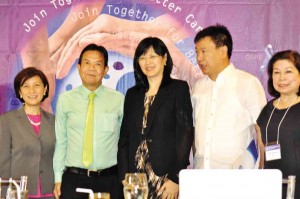
HOPING FOR THE BEST Doctors Sylvia Estrada of the Institute of Human Genetics, Galvez Tan, Padilla, Rep. Ting, and Magdaraog pray for the passage of Rare Diseases Act this year.
Enjoying the windfall revenues from the Sin Tax Law as well as the realignment of Priority Development Assistance Fund or the pork barrel, the Department of Health (DOH) will have its highest budget increase in history—from P53 billion in 2013 to P83.7 billion this year.
This 57-percent increase in the budget, according to Health Secretary Enrique Ona, will benefit the Philippine Health Insurance Corp. (PhilHealth) that seeks to enroll 14.7 million indigent families or 45 million individuals this year; improve DOH hospitals as well as those run by local government units; and increase medical assistance programs for the poor.
Said Philippine Society for Orphan Disorders (PSOD) president Cynthia Magdaraog during a press briefing held in Intramuros, Manila: “We just hope that with the increased budget, it would now be much easier for the lawmakers to pass the bill that would increase the access of persons afflicted with rare diseases to medical treatment and drugs, and include them in the coverage of the government’s universal healthcare program. A substantial budget, say P100 million, coming from the DOH would do a lot for our members who have been for years, rely on donations if not money out of their own pockets.”
Big funding
Magdaraog said PSOD has continuously been appealing to lawmakers to pass the Rare Diseases Act of 2014 (Senate Bill No. 2098) that will provide an appropriate, responsible and sustainable drug funding for rare diseases as well as create a Rare Disease Registry, which will contain data on patients and orphan drugs needed by afflicted patients.
Finding treatments or ways to manage rare diseases such as Maple Drug Urine Disease and Blue Rubber Bleb Nevus Syndrome require hundreds of thousands of pesos in annual funding, as members of PSOD know all too well.
“As we have realized, in the inverted world of drug pricing, the fewer patients a drug helps, the more it costs. This is because rare diseases were the neglected stepchild of drug makers. This situation is now changing as a number of firms have already stepped up their research on developing a cure,” said PSOD board member Dr. Sylvia Estrada.
Orphan diseases—believed to be between 7,000 and 8,000 types—represent a collection of disorders that affect only a fraction of the population. Here in the country, the number of people with rare diseases could reach 5,000 although so far, only around 300 Filipinos were registered to have any of the 41 rare diseases identified in the country.
Registry
The bill Sen. Pia Cayetano filed last Feb. 3 (SB 2098) will task the DOH to establish a National Rare Disease Registry which will include an inventory of rare diseases in the country, information on diagnosed patients, and a list of certified medicines and medical devices.
Under the same bill, patients suspected or diagnosed with rare disease will be referred to Regional Newborn Screening Centers, which will then coordinate with the DOH and concerned medical facilities for the “co-management” of the patient with a specialist.
The bill likewise will recommend the inclusion of rare disease treatment in the health benefit package of PhilHealth. Additionally, medical drugs and devices used for treating rare diseases will be certified by the country’s Food and Drugs Administration to facilitate the public’s access to these products.
Aside from Cayetano, several lawmakers have also filed their own versions both in the Senate and in the House of Representatives. The versions of Sen. Miriam Defensor-Santiago (SB 1868, filed Oct. 21, 2013) as well as Representatives Randolph Ting (House Bill No. 3896, filed Feb. 11, 2014), Alfredo Vargas III (HB 3634, filed Dec. 17, 2013) and Sol Aragones (HB 3258, filed Oct. 24, 2013) seek to have a comprehensive policy to address the needs of individuals with rare diseases. On the other hand, Rep. Diosdado Macapagal-Arroyo’s version (HB 2800, filed Sept. 20, 2013) hopes to create a Department of Health Office of Rare Diseases as well as provide incentives for the manufacture or importation of healthcare products for persons with rare diseases.
Bigger challenge
However, for former health secretary Dr. Jaime Galvez Tan, the greatest challenge will not be securing funding for the healthcare of patients with rare diseases but their inclusion—along with the indigenous people, people with disabilities and older persons—in universal healthcare.
Galvez Tan, who is also president of Health Futures Foundation Inc., urges the immediate passage of the bill, considering that the right to health of the poorest, marginalized and disenfranchised remains illusory. “While all Filipinos must have fair, just and equal access to healthcare, social realities attest to the contrary,” he lamented.
PSOD founding chair Carmencita Padilla said getting the nod of lawmakers is expected because supporting patients with rare diseases is in line with the United Nations Convention on the Rights of the Child and the country’s Millennium Development Goal 4 (reduce child mortality).
She said: “Rare and genetic diseases affect 300 million people globally. It is estimated that 50 percent of people affected by rare diseases are children, making rare diseases one of the most deadly and debilitating for children worldwide.”
Padilla added that a lot of people with rare disorders in the country are missing out on treatments that could save or significantly improve their lives. “This needs to change and the passage of the Rare Disease Act is an important step forward.”